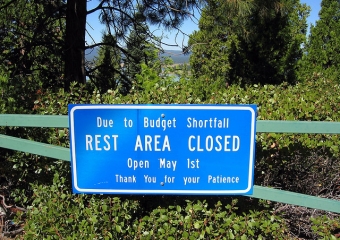

Photo by Amit Patel is licensed under CC BY 2.0
A survey by the Associated Press found 22 states projecting budget shortfalls in the coming fiscal year. Something has to give…and most believe it will be services.
Declining tax revenues and rising pension and health care costs are contributing to the budget shortfalls. And, the results will be significant – cuts in service, fewer employees, reductions in maintenance, security and employee benefits.
The impact will hit military bases, public school programs, higher education, health care clinics, social services and maintenance.
In Louisiana, critics say that tax credits and exemptions are to blame, but the governor points to lower oil prices. Budget problems in Kansas began after lawmakers slashed personal income taxes in 2012 and again in 2013. The state is now diverting highway funds and revenues from special programs to cover shortfalls in critical areas.
Most states are mandated to balance the budget. The National Conference of State Legislatures (NCSL) reported that 49 states must balance their budgets, with Vermont being the exception. Many states will rely on one-time revenue sources to plug budget gaps in the coming year. Taxpayers should be uncomfortable with that – to say the least.
Illinois is facing the largest budget gap of any state after a temporary tax increase expired Jan. 1. A special session is now under way because legislators passed a spending plan that was $3 billion out of balance. The governor refused to sign it. An agreement must be reached by June 30 – the last day of FY 2015 – or all funding is locked down.
Washington has already endured one special session and legislators are into the second one. They are grappling with a projected shortfall of more than $2 billion. Alabama’s governor will call for a special session later this summer. He vetoed a budget that was short by $200 million. Alabama legislators balked at the tax increases he had called for, so shortly, the budget battle will begin again.
In Pennsylvania, lawmakers have yet to detail how they will close a $1.2 billion hole in the state budget. Both sides of the aisle agree that the income and expense gap is well above $2 billion and that one-time revenue sources will likely be the only solution. Many proposals are on the table and one option is to change the state-controlled liquor store system and use the increased revenues to cover pension obligations. Pennsylvania must pass an operating budget before July 1.
With time running out, the summer months will continue to be stressful. Budget writers may avoid tax increases for a bit longer, but it is likely that taxes will increase. It is also almost a certainty that taxpayers will soon see big changes in the way services are delivered.
To learn more about the state budget cuts and partnering with the state government on projects, contact one of our procurement consultants or email us at sales@spartnerships.com.
